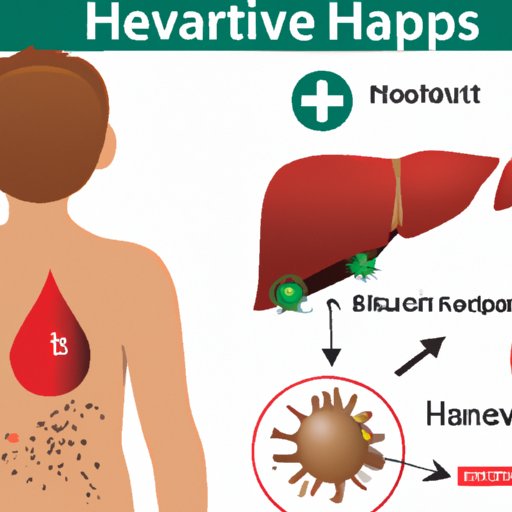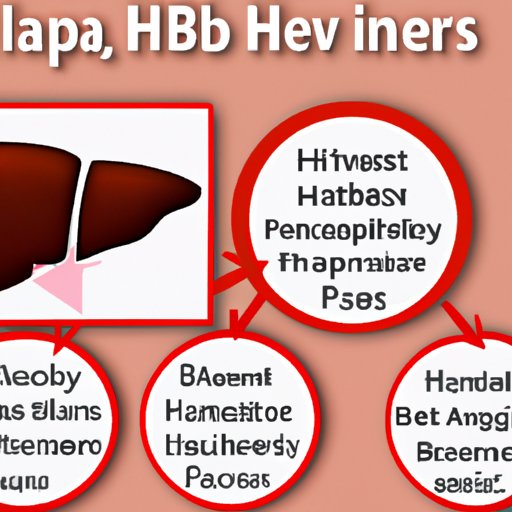
Introduction
Hepatitis B is a viral infection that targets the liver, commonly transmitted through the exchange of bodily fluids. While it is a vaccine-preventable disease, it can still be contracted by those who are not properly vaccinated or those who may be at an increased risk of exposure. Understanding the symptoms of hepatitis B is crucial for early detection and treatment.
Understanding the Symptoms of Hepatitis B: A Comprehensive Guide
The symptoms of hepatitis B can range from mild to severe and can vary from person to person. However, some general symptoms are common among those infected by the virus.
How the Virus Affects the Liver
The virus targets the liver and causes inflammation, leading to a wide range of symptoms. The liver is responsible for removing toxins and waste from the body, producing bile that aids in digestion, and storing glucose that the body uses for fuel. When the liver is inflamed, it struggles to carry out these functions effectively, leading to the symptoms of hepatitis B.
Chronic vs Acute Hepatitis B
There are two types of hepatitis B: acute and chronic. Acute hepatitis B occurs when someone is first infected with the virus, whereas chronic hepatitis B occurs when the virus is present for more than 6 months. Chronic hepatitis B can lead to serious liver damage, including cirrhosis and liver cancer, and requires ongoing medical care.
The Role of Vaccinations
The hepatitis B vaccine is the most effective way to prevent infection. It is recommended that all newborns receive the vaccine, and it is also recommended for adults who are at an increased risk of exposure. The vaccine series consists of three shots, with the second and third shots given within six months of the first.
The Silent Enemy: Uncovering the Symptoms of Hepatitis B
The Asymptomatic Phase of Infection
The asymptomatic phase of hepatitis B infection refers to the period where a person has no symptoms of the virus. This phase can last for several weeks, months, or even years. During this phase, the virus is still present in the body and can be transmitted to others.
Why Early Detection is Crucial
Early detection of hepatitis B is crucial because it allows for treatment before the virus causes serious liver damage. Early detection also reduces the risk of transmission to others.
The Risk of Transmission During the Asymptomatic Phase
Hepatitis B can be transmitted to others during the asymptomatic phase of the infection. The virus is present in bodily fluids, including blood, semen, and vaginal fluids, and can be spread through sexual contact, sharing needles, or from mother to baby during birth.
From Fatigue to Jaundice: Recognizing the Signs of Hepatitis B
Overview of Common Symptoms
Common symptoms of hepatitis B include:
- Fatigue
- Flu-like symptoms (body aches, fever)
- Abdominal pain
- Loss of appetite
- Nausea/vomiting
- Joint pain
Jaundice: What It Is, Why It Happens, and What to Look Out For
Jaundice is a common symptom of hepatitis B, occurring in more severe cases. It is caused by a buildup of bilirubin in the blood, which causes yellowing of the skin and eyes. Jaundice can also cause itchy skin, dark urine, and pale stools.
Other, Less Common Symptoms
In addition to the common symptoms, some people may experience less common symptoms, including:
- Itchy skin
- Dark urine
- Pale stools
Hepatitis B Symptoms: What You Need to Know to Stay Protected
How to Reduce Your Risk of Contracting Hepatitis B
The best way to reduce your risk of contracting hepatitis B is to get vaccinated if you haven’t already. Other ways to reduce your risk include:
- Practicing safe sex
- Not sharing needles or other drug paraphernalia
- Using standard precautions in healthcare settings
- Avoiding direct contact with blood or bodily fluids
What to Do If You Suspect You Have Contracted the Virus
If you suspect you have contracted hepatitis B, it is important to seek medical attention immediately. A simple blood test can diagnose the infection. Early detection can lead to effective treatment and reduce the risk of liver damage.
Overview of Treatment Options
Treatment options for hepatitis B depend on the severity of the infection. For acute cases, treatment is focused on managing symptoms. Chronic cases may require antiviral medication or other interventions to manage liver damage.

The Hidden Dangers of Hepatitis B: Recognizing the Symptoms Early
The Risks of Untreated Hepatitis B
Untreated hepatitis B can lead to serious liver damage, including cirrhosis and liver cancer. It is important to seek medical attention if you suspect you have been infected with the virus.
The Importance of Identifying Symptoms Early
Early identification of symptoms is crucial for effective treatment and reducing the risk of liver damage.
What to Do If You Suspect You Have Hepatitis B
If you suspect you have been infected with hepatitis B, seek medical attention immediately. Your healthcare provider can perform a simple blood test to diagnose the infection.
Shedding Light on Hepatitis B Symptoms: How to Spot the Warning Signs
Overview of Common and Uncommon Symptoms
The most common symptoms of hepatitis B are fatigue, flu-like symptoms, abdominal pain, loss of appetite, nausea/vomiting, joint pain, and jaundice. It is important to be aware of less common symptoms, including itchy skin, dark urine, and pale stools.
Tips for Monitoring Your Overall Health
To monitor your overall health, it is important to get regular checkups with your healthcare provider. It is also important to practice healthy lifestyle habits, including eating a nutritious diet, getting regular exercise, and avoiding alcohol and drugs.
What to Do If You Suspect You Have Contracted Hepatitis B
If you suspect you have contracted hepatitis B, seek medical attention immediately. Your healthcare provider can perform a simple blood test to diagnose the infection. Early detection is crucial for effective treatment and reducing the risk of liver damage.
Conclusion
Recap of Key Takeaways
Understanding the symptoms of hepatitis B is crucial for early detection and treatment. Common symptoms include fatigue, flu-like symptoms, abdominal pain, loss of appetite, nausea/vomiting, joint pain, and jaundice. Less common symptoms include itchy skin, dark urine, and pale stools. Early detection is crucial for effective treatment and reducing the risk of liver damage, which can lead to serious complications, including cirrhosis and liver cancer.
Encouragement to Seek Medical Attention If Symptoms are Present
If you suspect you have been infected with hepatitis B, seek medical attention immediately. Your healthcare provider can perform a simple blood test to diagnose the infection. Early detection can lead to effective treatment and reduce the risk of liver damage.
Final Thoughts on Staying Safe and Protected from Hepatitis B
Staying safe and protected from hepatitis B is easy with proper vaccination and safe lifestyle habits. Avoiding high-risk behaviors, practicing safe sex, and not sharing needles or drug paraphernalia can all reduce your risk of contracting the virus. Regular checkups with your healthcare provider can also help detect any potential infections early.




